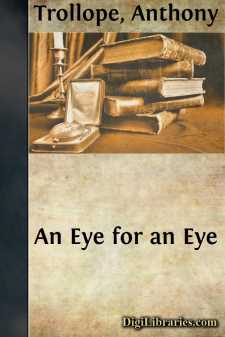Categories
- Antiques & Collectibles 13
- Architecture 36
- Art 48
- Bibles 22
- Biography & Autobiography 813
- Body, Mind & Spirit 142
- Business & Economics 28
- Children's Books 15
- Children's Fiction 12
- Computers 4
- Cooking 94
- Crafts & Hobbies 4
- Drama 346
- Education 46
- Family & Relationships 57
- Fiction 11828
- Games 19
- Gardening 17
- Health & Fitness 34
- History 1377
- House & Home 1
- Humor 147
- Juvenile Fiction 1873
- Juvenile Nonfiction 202
- Language Arts & Disciplines 88
- Law 16
- Literary Collections 686
- Literary Criticism 179
- Mathematics 13
- Medical 41
- Music 40
- Nature 179
- Non-Classifiable 1768
- Performing Arts 7
- Periodicals 1453
- Philosophy 64
- Photography 2
- Poetry 896
- Political Science 203
- Psychology 42
- Reference 154
- Religion 513
- Science 126
- Self-Help 84
- Social Science 81
- Sports & Recreation 34
- Study Aids 3
- Technology & Engineering 59
- Transportation 23
- Travel 463
- True Crime 29
The Bertrams
by: Anthony Trollope
Description:
Excerpt
CHAPTER I.
VÆ VICTIS!
This is undoubtedly the age of humanity—as far, at least, as England is concerned. A man who beats his wife is shocking to us, and a colonel who cannot manage his soldiers without having them beaten is nearly equally so. We are not very fond of hanging; and some of us go so far as to recoil under any circumstances from taking the blood of life. We perform our operations under chloroform; and it has even been suggested that those schoolmasters who insist on adhering in some sort to the doctrines of Solomon should perform their operations in the same guarded manner. If the disgrace be absolutely necessary, let it be inflicted; but not the bodily pain.
So far as regards the low externals of humanity, this is doubtless a humane age. Let men, women, and children have bread; let them have if possible no blows, or, at least, as few as may be; let them also be decently clothed; and let the pestilence be kept out of their way. In venturing to call these low, I have done so in no contemptuous spirit; they are comparatively low if the body be lower than the mind. The humanity of the age is doubtless suited to its material wants, and such wants are those which demand the promptest remedy. But in the inner feelings of men to men, and of one man's mind to another man's mind, is it not an age of extremest cruelty?
There is sympathy for the hungry man; but there is no sympathy for the unsuccessful man who is not hungry. If a fellow mortal be ragged, humanity will subscribe to mend his clothes; but humanity will subscribe nothing to mend his ragged hopes so long as his outside coat shall be whole and decent.
To him that hath shall be given; and from him that hath not shall be taken even that which he hath. This is the special text that we delight to follow, and success is the god that we delight to worship. "Ah! pity me. I have struggled and fallen—struggled so manfully, yet fallen so utterly—help me up this time that I may yet push forward once again!" Who listens to such a plea as this? "Fallen! do you want bread?" "Not bread, but a kind heart and a kind hand." "My friend, I cannot stay by you; I myself am in a hurry; there is that fiend of a rival there even now gaining a step on me. I beg your pardon; but I will put my foot on your shoulder—only for one moment. Occupet extremum scabies."
Yes. Let the devil take the hindmost; the three or four hindmost if you will; nay, all but those strong-running horses who can force themselves into noticeable places under the judge's eye. This is the noble shibboleth with which the English youth are now spurred on to deeds of—what shall we say?—money-making activity. Let every place in which a man can hold up his head be the reward of some antagonistic struggle, of some grand competitive examination. Let us get rid of the fault of past ages. With us, let the race be ever to the swift; the victory always to the strong. And let us always be racing, so that the swift and strong shall ever be known among us....












